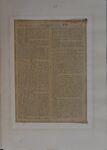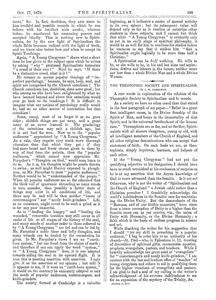< Spiritualism and the Church of England (continued from page 10-68) >
ment,” &c. In fact, doubtless, they now seem to him truthful and possible records in which he can believe with his intellect wide awake, whereas before, he smothered his reasoning powers and accepted blindly. This is nothing new to Spiritualists, for by the new light of ' Spiritualism the whole Bible becomes radiant with the light of truth, and we know also better how and when to accept its Spirit Teachings.
Again, “A Young Clergyman” shows what a short time he has given to the subject upon which he writes by asking “why” professed Spiritualists formulate “a creed of their own?” Next he says, “If there be a distinctive creed, what is it?”
He refuses to accuse popular theology of “imperfect psychology,” because, he says, body, soul, and spirit are recognised by the Church catechism! The Church catechism has, doubtless, done some good; but who among us who have been enlightened by what we have learned beyond and above this catechism would ever go back to its teachings 1 It is difficult to imagine what our notions of psychology really would be, had we no other source of instruction but that catechism!
Some, many, most of us forget it as we grow older; childish things are put away, and a great many of us never learned it. The psychology of the catechism may' suit a childish age, but it is not food for men. Now as to the “popular audience” appreciated by “A Young Clergyman.” As a rule, they require very much more thorough education than that which they get, if they had more bread and fewer stones given to them by way of food from the pulpits, then the “popular audiences,” which cannot now appreciate Mr. Farquhar’s “Thoughts on God,” would soon learn to do so. As it is, his 'thoughts might be pearls thrown to swine; as well might Huxley expound to ploughmen, as Mr. Farquhar to most “popular audiences.” Neither would he be “understanded of the people.” When all popular audiences are so far educated that the thick veil of ignorance shrouding so many minds is torn asunder, then possibly a better state of things may exist in all conditions of life, and there may be and will be then neither “knots of costermongers” nor “needy knife-grinders.” Life, as an existence, ought never to be such a grind as it is for any poor immortal.
As to “feeding the hungry” and “healing the wounded,” removable troubles may still occur in all ranks of life at all stages' of the history of the soul, and many minds of another order to those referred to by “A Young Clergyman” are fed and can be fed by Mr. Farquhar’s noble ideas and lofty thoughts, and many wounds can be healed by the consolation he gives. In Mr. Farquhar’s views I see no “earth- born system,” but one freed from the stains of earth; and therefore if one can apply the word “system,” as “A Young Clergyman” does, it is one adapted towards aiding the soul in its upward flight. It is true this is meeting assertion with assertion. I only give it as the assertion of my opinion; but still it appears to me, if it were an “earth-born system,” it would on the contrary be eminently adapted to suit the needs of popular audiences, costermongers, and knife-grinders.
The society formed at Cambridge is a valuable beginning, as it indicates a centre of mental activity in its own sphere; but its subsequent value will depend only so far as it reaches or outstrips other students in these subjects, and I cannot but think that while “A Young Clergyman” is evidently only as yet in an early stage of spiritual philosophy, it would be as well for him to continue his studies before he ventures to say that it strikes him “that a Spiritualist ought logically to be more than half a Christian.”
A Spiritualist can be half nothing. He wills to be, or she wills to be, in his and her aims and aspirations, desires and labours in the future, neither more nor less than a whole Divine Man and a whole Divine Woman.
The Theosophic Society and Spiritualism
A few words in explanation of the relation of the Theosophic Society to Spiritualism and to creeds.
As a society we have no other creed than that stated in the first paragraph of my paper—“Belief in a great first intelligent cause, in the Divine Sonship of the Spirit of Man, and hence in the immortality of that Spirit, and in the universal brotherhood of the human race.” Theosophists are so far, and no further, Spiritualists with all sincere clergymen, young or old, with all intelligent members of the Church of England, and all other religious denominations who can accept that statement of faith. On such basis we are, as theosophists, simply inquirers, learners, and helpers of each other.
If the “Young Clergyman” had not put the qualifying adjective to his designation I should have been as much astonished at his confession of surprise as he is at my assertion that the Aryan knowledge of God is more advanced than the Semitic. Is it not so? Otherwise, why is not the writer of “Spiritualism and the Church of England” a Jewish rabbi rather than a Christian preacher? I thankfully acknowledge the world’s indebtedness to the Semitic race for maintaining the Divine Unity. But the descendants of the “Romans, and of our Gothic ancestors,” have risen from a lower conception of Deity to a higher than the Semitic races can as yet receive, viz., the union of Deity with Humanity, or the Divine Humanity; a faith which is the basis of endless progress in science and art.
While thanking the writer for his suggestion that I should “try my skill in preaching to a popular audience,” I beg to refer him to an authority of his church—St. Paul—who, in Ephesians iv. 11, treating of diversities of spiritual gifts, enumerates apostles, prophets, evangelists, pastors, and teachers. While I heartily acknowledge the great need of “evangelists” for “costermongers and needy knife-grinders,” I am content with the last and lowliest office of “teacher" of young clergymen and others to aid in qualifying them for the higher vocations of evangelists and pastors. I am glad' to find a seal of my calling in the writer’s acknowledgment of his extreme indebtedness to me for an exposition of the mystery of the Trinity, &c.
October 11, 1879.
Editor's notes
- ↑ The Theosophic Society and Spiritualism by Farquhar, J.W., London Spiritualist, No. 373, October 17, 1879, p. 185
Sources
-
London Spiritualist, No. 373, October 17, 1879, p. 185


